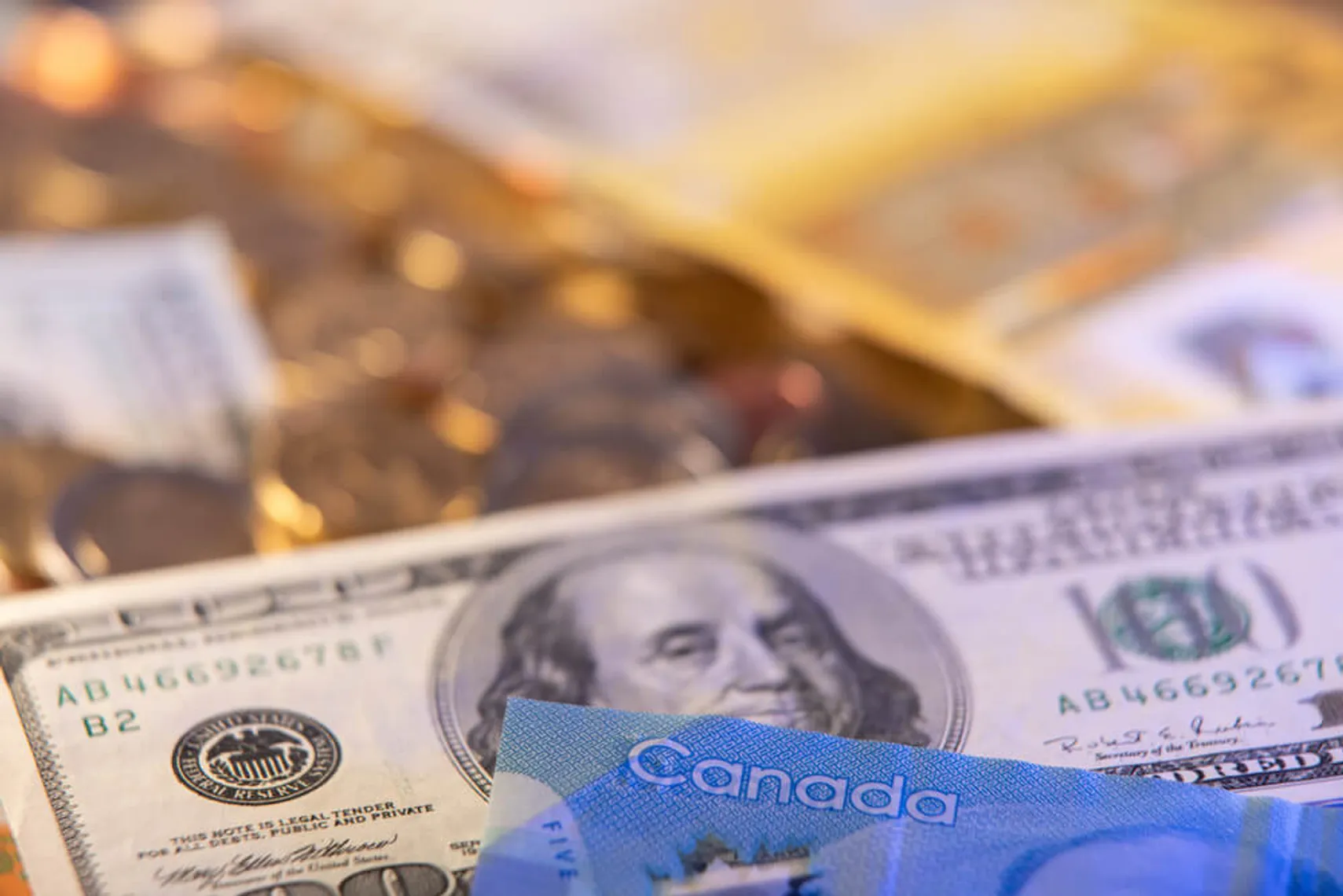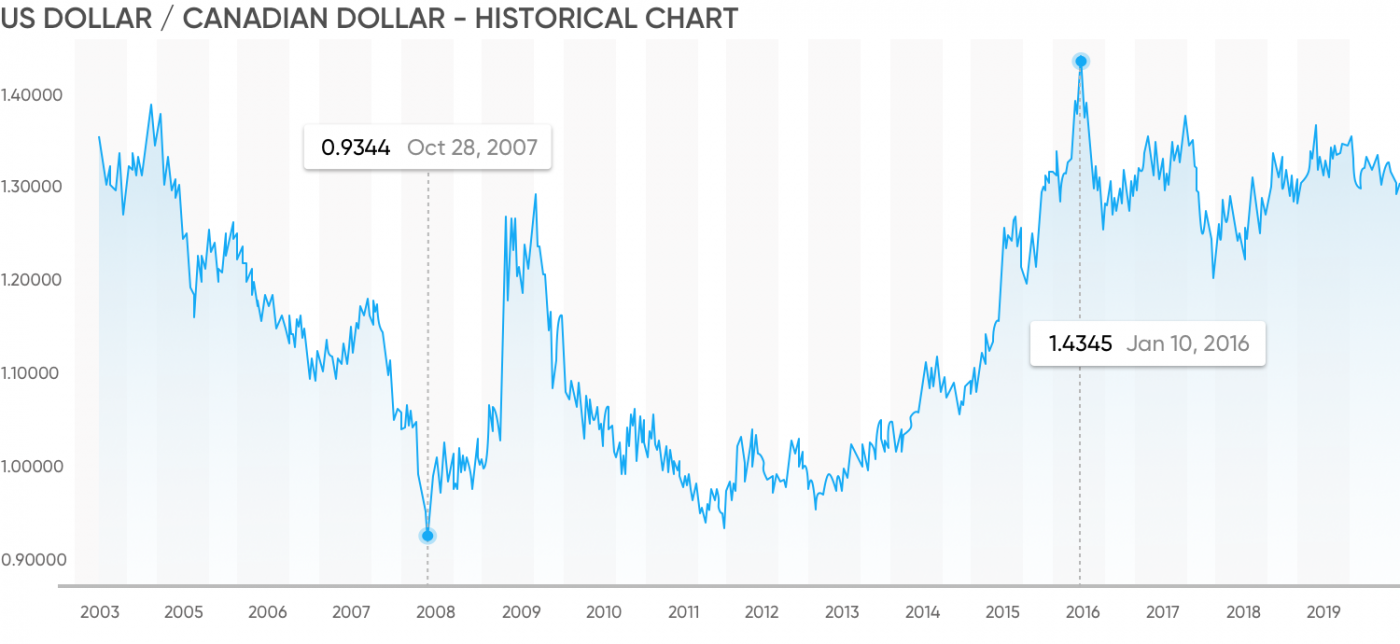Your guide to trading the USD/CAD forex pair

Why is the USD/CAD an important market?
The US to Canadian dollar (USD/CAD) – called the ‘Loonie’ in reference to the Canadian one-dollar coin – is one of the most actively traded currency pairs in the forex market – learn about what it means for investors and CFD traders.
Trade [120]+ forex CFDs with Capital.com.
USD/CAD trading hours
The forex market operates 24 hours a day, five days per week.
USD/CAD activity may be higher during the North American trading session, which runs from 8am to 5pm local time in New York and Toronto (12pm to 9pm UTC). Significant market announcements and data releases could also lead to elevated volumes.
History of USD/CAD
The US dollar needs no introduction and is paired with all the main world currencies. It dates back to 1792, when the United States Congress established the US dollar as the country's currency under the Coinage Act of 1792. It serves as legal tender in a number of countries and it’s still regarded as the world’s first reserve currency.
Back in the early 1850s, Canada began its departure from the colonial pound and moved towards a decimalised Canadian dollar, which was officially adopted in 1858. The Canadian dollar used to be pegged to the USD, but since 1970, it has been a freely floating currency, with monetary policy managed by the Bank of Canada.
Historic exchange rate USD to CAD:
Past performance is not a reliable indicator of future results
Factors influencing the USD/CAD
Role of USD
As the most traded currency in the world, the US dollar is affected by a variety of factors. Economic data releases and policy statements from the Federal Reserve, along with other official sources, are among the most influential. Such information can help traders understand how the market may change in the future.
The Bureau of Labor Statistics releases non-farm payroll numbers for the US, usually on the first Friday of each month. This data can produce volatility in the value of the USD, which in turn may influence the USD/CAD currency pairing.
Role of CAD
The Bank of Canada can be a significant influencer of the value of the Canadian dollar. It implements monetary policy with the primary objective of keeping inflation low and stable, which in turn supports economic and employment growth. The Bank has not directly intervened in the currency markets since 1998, although it retains the option to do so if deemed necessary.
Canada is a major exporter of materials and commodities, such as wood, grain, minerals and petroleum etc. Its close trading relationship with the United States has bolstered Canada’s import and export industries and contributes to the Canadian dollar’s liquidity and status as a widely traded currency in the foreign exchange market.
How to trade USD/CAD CFDs
You can trade USD/CAD directly via spot forex trading, or you can use a contract for difference (CFD) on the pair to speculate on price movements without owning the underlying currencies.
A CFD is a financial contract between a provider and a client, where the parties agree to exchange the difference in value of an underlying asset between the opening and closing of the contract. This lets you speculate on price movements without taking ownership or physical delivery of the underlying currency pair.
For example, you might open a long position (buy) if you expect the price of USD/CAD to rise, or a short position (sell) if you anticipate the pair will fall in value.
CFDs are complex instruments and carry a high risk of losing money rapidly due to leverage. You should ensure you fully understand how CFDs work and carefully consider whether you can afford the risk of losing your money.
Trade USD/CAD CFDs.
Past performance is not a reliable indicator of future results.
Why trade USD/CAD CFDs with Capital.com
Advanced technology – our news feed delivers curated content based on your interests; SmartFeed offers analysis and educational material to inform your decisions – recommending videos, articles, and news to help enhance your trading strategy.
Trade on margin – CFDs are traded on margin with leverage of up to 30:1 for retail clients on major forex pairs such as USD/CAD. Leverage beyond 1:1 magnifies both potential gains and potential losses. Professional accounts may access higher leverage, depending on regulatory classification.
Contracts for difference (CFDs) – by trading USD/CAD CFDs, you speculate on whether its price will rise or fall. You can go short or long, set stop-loss (not guaranteed) and take-profit orders to manage risk, and apply trading scenarios that align with your objectives.*
Sharpen your analysis – stay informed about the latest moves with [100]+ technical indicators – including chart-drawing tools and more.
We prioritise your safety – Capital.com places strong emphasis on security. The platform operates through entities authorised and regulated by authorities including the FCA, MENA, ASIC, SCB, and CySEC, and other relevant authorities.
Rapid withdrawals – withdrawal requests can be submitted 24/7, and are processed within one business day. Actual receipt of funds may depend on your payment provider, bank, or compliance checks. Client funds are held in segregated accounts in accordance with local regulations.
*Stop-loss orders aren’t guaranteed. Guaranteed stop-loss orders (GSLOs) incur a fee when activated.
FAQ
How is Forex different to other markets?
Forex operates without a central exchange. Trading is decentralised and conducted over the counter, involving a wide range of participants worldwide. This structure tends to result in high trading volumes and can offer competitive bid-ask spreads, potentially lowering trading costs compared to some other markets.
Need more support? Try our step-by-step forex course to guide you through the basics to the advanced concepts.
I keep seeing the word 'pip,' what does that mean?
‘Pip’ stands for ‘percentage in point’. It represents the smallest standard unit of price movement in the forex market. For most major currency pairs, including USD/CAD, a pip is typically equal to 0.0001.
Does Capital.com take commission from my Forex trades?
The simple answer is 'no' – at Capital.com, you only pay the spread – which is the difference between the bid and ask prices – along with any applicable overnight funding charges. This differs from some brokers, who may charge a separate commission on each trade.